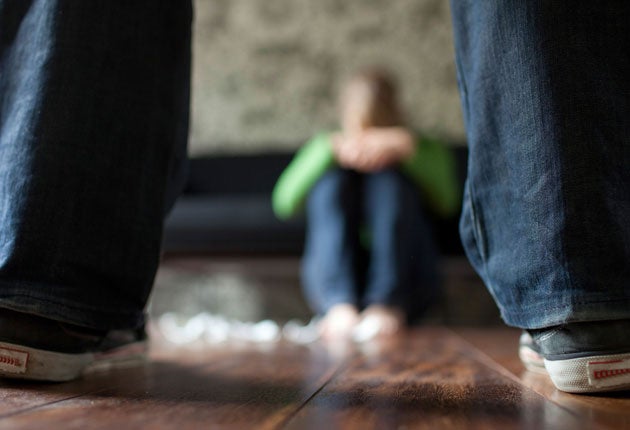Support for domestic violence victims at risk
New multi-agency schemes are under threat despite their success in helping women and children who have been abused

Tens of thousands of women most at risk of being seriously harmed or even killed by violent partners are not getting access to the help that could save them, domestic violence experts claim.
More than 28,000 adult and 40,000 child victims of domestic abuse were supported by a Multi-Agency Risk Assessment Conference (Marac) last year – where agencies join together to help high-risk victims. Many have been raped, strangled and beaten. But they are a fraction of the 120,000 adults and 117,000 children at high risk of severe abuse, according to a new report out tomorrow.
More than 200 multi-agency schemes currently operate nationally – fewer than the 300 that experts estimate are needed. The resulting provision lottery forces some women to wait weeks before they get help.
Diana Barran, the chief executive of Co-ordinated Action Against Domestic Abuse (Caada), which produced the report, said: "In some areas there are local committed individuals, but other areas don't have those individuals and there is very little in the way of commitment." She said the death of a child as a consequence of domestic abuse was often the catalyst for more resources being given to Marac teams.
The report warns that the new approach, first piloted in 2007, is being hampered because there is no legislation making Maracs statutory. They are vulnerable to being cut and even closed down, it warns. The future of the service is under threat, with funding due to run out in 2011, according to the charity, whose report calls on the Government to give legal protection to Maracs and to commit £120m in funding.
A national roll-out of the multi-agency approach, with support for the independent domestic violence advisers who play a key role, could save the taxpayer £740m a year, the report argues, by reducing the amount of time and money spent on dealing with repeat victims. Up to 60 per cent of those helped by Marac report no further violence. And for every £1 spent on the multi-agency approach, at least £6 could be saved in direct costs to the police, health, criminal justice system and children's services.
The report comes amid fears that the economic climate could cause a surge in domestic violence. Although cases have declined recently, partially because of greater efforts by the police and the growth of specialist services, they remain prevalent, said Professor Gene Feder from Bristol University. Professor Feder, who advises health ministers on domestic abuse, added, "It's still incredibly common, and we still have a major problem. When it comes to health consequences it ranks up there with major causes of ill health such as diabetes and cardiovascular disease. We are entering into years of economic pressure on households, which I think is going to manifest itself in increased violence."
Backing calls for more support for victims, Sandra Horley, the chief executive of Refuge, said: "Only one in four high-risk victims receives support from a Marac at present. That is simply not enough. All women and children experiencing domestic violence must have access to this level of support. It not only makes financial sense; it makes moral sense."
Wiltshire's chief constable, Brian Moore, the lead officer on violence and public protection at the Association of Chief Police Officers, warned: "Engagement in the multi-agency process is on a voluntary basis and, as a result, there is inconsistency in attendance and they are not operating to their full potential."
The Government has pledged to ensure Maracs cover all of England and Wales. A Home Office spokesman said: "To ensure every area has a Marac in place and that every relevant statutory agency attends them, the Government can see a case for this change, but it is important that we consult fully on the best way of achieving this. It is our intention to launch a public consultation by the summer 2010."
The stakes could not be higher, said Ms Barran. "I have people ringing me who say, 'I just want you to know this woman would be dead if it hadn't been for the Marac'. This is the single most important advance in dealing with domestic violence since the start of the refuge movement and it would be a travesty to lose it."
Case study: 18 years of violence
Debbie Tyler, 38, from Wiltshire [details changed], and her children suffered repeated beatings from an abusive husband. It started on her wedding day
"My husband was a real Jekyll and Hyde character. As well as physical abuse, he told me he'd kill me and the kids if I ever left him, so for 18 years I stayed. One weekend last year, after he attacked one of the children, she went to her doctor, who referred her to an independent domestic violence adviser (IDVA). I'd never have been able to move on in my life without the support offered by the Marac and IDVA service. The agencies did all they could to make our lives safer. We're now living a life that is free from violence and a lot happier."
Subscribe to Independent Premium to bookmark this article
Want to bookmark your favourite articles and stories to read or reference later? Start your Independent Premium subscription today.
